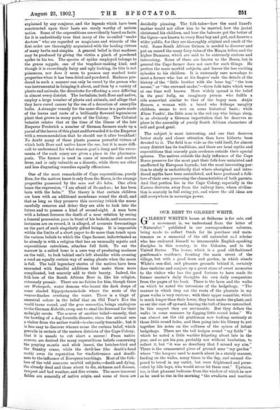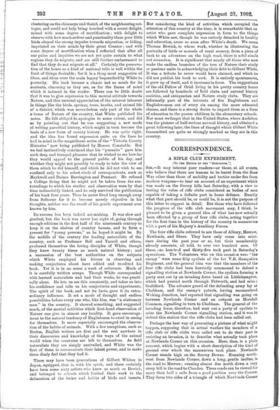OUR DEBT TO GILBERT WHITE.
GILBERT WHITE'S house at Selborne is for sale, and a movement is, we understand from the letter of " Naturalist " published in our correspondence columns, being made to collect funds for its purchase and main- tenance as a memorial of the old naturalist and scholar who has endeared himself to innumerable English-speaking disciples in this country, in the Colonies, and in the United States. The house, which is a good old-fashioned gentleman's residence, fronting the main street of the village, but with a good lawn and garden, in which stands White's sun-dial, and pleasure grounds behind it, certainly does enshrine and conjure up a great store of sweet memories to the visitor who has the good fortune to have made its former master's daily thoughts his own daily companions from the pages of his book. There is the lawn and the walks on which he noted the intrusions of the hedgehogs. " The manner in which they eat the roots of the plantain in my grass walks is very curious ; with their upper mandible, which is much longer than their lower, they bore under the plant, and so eat the root off upward, leaving the tuft of leaves untouched. In this respect they are serviceable. But they deface the walks in some measure by digging little round holes." We can almost see the old gentleman now looking seriously at those little round holes, and then going into his library to put together his notes on the softness of the spines of infant hedgehogs. There are the tall hedges round " my fields " in which he noted a little warbler fidgeting about late in the year, and so got his gun, probably not without hesitation, to collect it, but " it was so desultory that I missed my aim." There is the ornamented piece of ground near "my garden" where " the hoopoes used to march about in a stately manner, feeding on the walks, many times in the day, and seemed dis- posed to breed in my outlet, but were frightened and perse- cuted by idle boys, who would never let them rest." Upstairs, too, is that pleasant bedroom from the window of which he saw as he used to rise in the morning "the swallows and martins clustering on the chimneys and thatch of the neighbouring cot- tages, and could not help being touched with a secret delight, mixed with some degree of mortification ; with delight to observe with how much ardour and punctuality these poor little birds obeyed the strong impulse towards migration, or hiding, imprinted on their minds by their great Creator ; and with some degree of mortification when I reflected that after all our pains and inquiries we are not yet quite certain to what regions they do migrate, and are still further embarrassed to find that they do not migrate at all." Certainly the preserva- tion of the house as a kind of national relic is well within the limit of things desirable; for it is a thing most suggestive of ideas, and ideas were the main legacy bequeathed by White to posterity. His book became a classic not so much for its contents, charming as they are, as for the frame of mind. which it induced in the reader. There can be little doubt that it was to give expression to this mental attitude towards Nature, and this unusual appreciation of the interest inherent in things like the birds, springs, trees, heaths, and animal life of a district, which was nevertheless only part of the whole atheme of Nature of the country, that White published his notes. He felt obliged to apologise to some extent, and did so by pointing out that he was suggesting a new mode of writing parochial history, which might in turn become the basis of a new form of county history. He was quite right, and the idea has found expression quite on the lines he had in mind in the magnificent series of the " Victoria County Histories" now being published by Messrs. Constable. But we feel instinctively convinced that his " pursuits " gave him such deep and tranquil pleasure that he wished to see bow far they would appeal to the general public of his day, and whether they might not possibly be ready to take the view of them which he did himself, and which he did not wish to see confined only to his select circle of correspondents, such as Markwell and Demme Barrington and Pennant. He refused a College living that he might not be taken from the sur- roundings to which his studies and observation were by that time indissolubly linked, and he only survived the publication of his book four years. Thus he never lived long enough away from Selborne for it to become merely objective in his thoughts, neither was the result of his gentle experiment ever known by him.
Its success has been indeed astonishing. It was slow and gradual, but the book was never lost sight of, going through enough editions in the first half of the nineteenth century to keep it on the shelves of country houses, and to form a present for "young persons," as he hoped it might be. By the middle of the century the leading naturalists of the country, such as Professor Bell and Yarrell and others, professed themselves the loving disciples of White, though they knew twenty times as much natural history ; and a succession of the best authorities on the subjects which White employed his leisure in observing and making conjectures about have edited and re-edited his book. Yet it is in no sense a work of reference. Much of it is carefully written scraps. Though White corresponded with learned naturalists and had their works, be was practi- cally alone. He lets us see this constantly, and takes us into his confidence and tells us his conjectures and experiments. The spirit of the book, and not its facts, gave it its extra- ordinary influence. It set a mode of thought and endless possibilities before every one who, like him, was "a stationary man" in the country. It showed something, and suggested much, of the mental activities which first-hand observation of Nature can give in almost any locality. It gave encourage- ment to the natural tendency of Englishmen to excel in seeing for themselves. It more especially encouraged the observa- tion of the habits of animals. With a few exceptions, such as Brehm, English writers are first and the rest nowhere in their discoveries and knowledge of the ways of the animal world when the creatures are left to themselves. As field naturalists they are simply unrivalled, and White was the first of them to communicate their latent power, and to make them dimly feel that they had it.
There may have been generations of Gilbert Whites in Japan, equipped, that is, with his spirit, and there certainly have been some sixty artists who knew as much as Bewick, and belonged to schools which limited their work to the delineation of the forms and habits of birds and insects.
But considering the kind of activities which occupied the attention of this country at the time, it is remarkable that an artist who gave complete expression in form to the things which White saw, though he was entirely detached in locality and education, arose so soon after White's death. We mean Thomas Bewick, to whose work, whether in illustrating the portraits of birds or morsels of rural scenery, from a piece of bark to an adventure on the high road, there is nihil simile aut secundum. It is significant that nearly all those who now make the endless branches of the tree of Nature their study or pastime unite in acknowledging their debt to Gilbert White. It was a tribute he never would have claimed, and which he did not publish his book to seek. It is entirely spontaneous, it grew up of itself, and it increases in force. The suggestions of the old Fellow of Oriel living in his pretty country house are followed by hundreds of held clubs and natural history societies, and antiquarian and Nature study clubs. They are informally part of the interests of five Englishmen and Englishwomen out of every six among the more educated classes, and there is a strong desire to impart them as a form of education to the poorer children in the elementary schools. Nor must we forget that in the -United States, where Audubon was the pioneer of half-serious natural history, and obtained a great following later, the lines of thought which Gilbert White transmitted are quite as strongly marked as they are in this country.







































 Previous page
Previous page